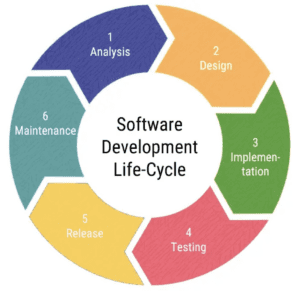KEY TAKEAWAYS
Software project management is a specialized field that has become more important recently. With the increased reliance on software products, there’s been more emphasis put on ensuring that projects are completed on time and with as few bugs as possible.
Suppose you want to get into software project management. In that case, it’s essential to understand a software project manager’s job description, what makes this profession different from other project management jobs, and what skills you will need to thrive in this specialization.
What Is a Software Project Manager?
A software project manager is responsible for leading a team of software developers and ensuring that software projects are completed on time, within budget, and to the satisfaction of the stakeholders. They are responsible for planning, executing, and closing projects. This involves defining project scope, creating schedules, allocating resources, managing risks, and monitoring progress.
The project manager is also responsible for communicating with stakeholders, including clients, management, and team members, to ensure everyone is on the same page. They must have strong leadership skills, be able to manage competing priorities, and have a deep understanding of software development methodologies and tools. Overall, the role of a project manager in software is critical to ensuring the success of software projects.
What Is in the Software Project Manager Job Description?
The job description of a software project manager might include the following responsibilities:
- Preparing project proposals and discussing potential projects with clients and stakeholders
- Facilitating project initiation by defining project scope and requirements, and preparing the necessary documents and requirements
- Developing project plans and timelines to ensure the timely submission of project deliverables
- Managing project budgets and resources to ensure the timely completion of milestones
- Tracking and documenting progress and communicating project status updates to key stakeholders
- Identifying and managing project risks
- Facilitating team meetings and collaboration
- Liaising for changes and negotiations with relevant stakeholders
- Ensuring software quality standards are met and requirements are submitted within budget and on time
- Closing the project and ensuring proper documentation
What Are the Typical Job Requirements of a Software PM?
- A bachelor’s degree in information technology, software engineering, computer science, or other related field, or x years of experience in a relevant technical industry
- Knowledge and skills in Agile project management methodologies
- High communication and interpersonal skills
- High organizational skills
- Strong attention to detail, leadership, and problem-solving skills
- Proficiency in project management software, such as Jira and GitHub
- Critical thinking and decision-making skills
What Makes Software Project Management Different?
While software development follows the same general principles in project management, how it unfolds can be massively different.
Merging technical and creative
Good software effectively merges technical and creative expertise. First, it’s crucial for the technical infrastructure of your product to be sound. Complex functions and integrations have to perform as intended, and they have to be optimized for target devices. At the same time, the interface needs to be appealing and intuitive to users.
With stiff competition in the software industry, paying attention to both is paramount. And as a software development project manager, you’ll need to be able to work with both technical and creative teams to deliver the project on time and (ideally) under budget.
Specialized software
As with any industry, there are tools used in the software development industry that are niche to them. For example, game developers use game engines such as Unity and Unreal. GitHub and Bitbucket are also popular for code management and version control, respectively.
If you’re going to manage a software development project, familiarizing yourself with tools relevant to your project will allow you to become more helpful to your team.
Ambiguity of end results
Software development deliverables rarely ship the way they were planned. Along the way, information from testing and troubleshooting affects the implementation of its features, which isn’t necessarily bad.
To thrive in software development, you and your team need to embrace a certain level of ambiguity at the beginning of a project.
Abstract troubleshooting
Troubleshooting code isn’t always straightforward. When you encounter a bug, the amount of time needed to investigate its cause may vary. Sometimes, it’s quick. But sometimes, the developers might find it more complicated than what it looks like.
As a project manager, you’ll need to prepare for these scenarios. Sometimes, the amount of time required to resolve an issue is worth its value. But there will also be moments when you’ll need to make the hard call of letting them be.
Third-party software updates
Developing software consists of working with different third-party software as well. For example, if you’re making a multiplayer game, you’ll need to use a game engine like Unreal Engine, audio software like Wwise, voice chat software like Vivox, and hosting software like GameEye. Your application will also operate on specific operating systems for your target devices.
Ensuring your product is compatible with these third-party software is essential, especially when they push updates and changes which may require you to update your code.
Specializing in Software Project Management
Project management is a highly demanding role that requires a diverse set of skills. All project managers must be adept at managing stakeholder relationships, negotiating with vendors and contractors, and overseeing project timelines and budgets. In addition to these essential skills, software project managers require additional expertise in technical areas.
Proficiency with agile methodologies is critical for success in software development, as it allows for flexibility and rapid iteration. Technical proficiency is also a must-have skill for software project managers (PMs), as it enables them to understand the technical requirements of their projects and communicate effectively with developers. This includes learning how to navigate project management software, such as Jira, which is built specifically for software project teams.
Finally, software PMs must have patience in testing and iterating and an understanding of user experience research. These are critical to the success of any software product because they provide insight into how prospective users would interact with the product, and allow the software to be intuitive and easy to use.
Useful Skills for Software Project Managers
While many project management skills are transferable for every project — such as planning and an understanding of core project management concepts — some are especially important for the software project management industry.
Project manager responsibilities are generally the same for all industries. But because of some unique attributes in the software development industry, there are skills that need to be highlighted which may not be the case in a typical project manager job description.
Understanding of software development
The software development life cycle is slightly different from the standard project life cycle. Testing is a crucial part of the process because it helps ensure the product is at par with the intended quality and performs its features as intended. For some teams, testing even happens as early as the design stage.

Familiarize yourself with the software development life cycle to build your project management strategy around it.
Customer-centric mindset
It can be tempting to immerse yourself fully in your task list when working with software. However, it’s also essential to be in touch with what outcomes you want to produce for your users.
In the agile framework, work units are called user stories. Instead of writing down features, the end goals are identified. For example, instead of indicating a “Share to socials” feature, the user story would be, “As a millennial beauty enthusiast, I want to be able to share my favorite beauty product on my social channels, so I can start conversations about it with my community.”
Staying on top of your user stories can help you and your team discern focus and priorities.
Iterative project management methodologies
Software development thrives in iterative methodologies because it is dependent on user experience to succeed. Before pushing with the full product, it’s advisable to test its core features and implementation. So as a software project manager, it’s advisable to be highly proficient in agile project management methodologies.
Software development project management tools
As with any industry, there are specialized software industry professionals use in their field. For you to create workflows that complement the pipeline, it will be good for you to be familiar with tools that integrate with what they use.
For example, Jira is a platform especially made for software development. It is optimized for organizing the efforts of developers, managing bugs, and building/iteration of software features. It will be more optimal to use this than other general task management tools.
Prioritization and critical thinking
With so many changes that can potentially alter your plans, it’s vital for you and your team to maintain clarity on your goals and priorities. There will be times you’ll be in conflict with your team. They might want to focus on a specific feature that they find important.
As the project manager, you need to stay grounded on your goals and remain objective on which features will move the needle.
Clear communication
Not all software project managers work with clients who are as proficient in the software development industry. Sometimes, your team is hired exactly because they have a gap in that expertise.
As the project manager, you need to be able to serve as a liaison for your client and development team. This means you need to speak both languages: be in touch with the business priorities of your client while being able to explain the technical details in terms they understand.
Inquisitiveness
It takes a lot of experience and expertise to create software, and this is what your development team is here to provide. As a project manager, you need to be able to accept that you can’t always be the one solving problems. You may have spent years being good at your craft as a project manager. But, your development team has also done the same in their lines of work.
Still, it’s your role to facilitate problem-solving if needed. To do this effectively, you’ll need to learn to ask the right questions to help guide their trains of thought.
Leadership
Software development isn’t always a linear process, and it’s hardly possible to micromanage. Given this, it’s important for you to empower your team, so they can perform to the best of their ability.
In agile scrum frameworks, self-managing teams are key. To achieve this, encourage collaboration and leadership in your development team.
Empathy
Many times, you’ll need to make tough calls of cutting off some features. While it may be sensible on the business side, it’s not a guarantee that your whole development team will be as excited about it as you are.
Being hands-on in development tends to increase your development team’s attachment to the features they’re responsible for. While it’s important to be objective, remember to communicate with empathy and patience when you communicate your decisions.
Flexibility
Flexibility should be at the core of your skills as a software development project manager. While cutting features off is important internally and externally, adjusting priorities and sometimes processes on the fly will be vital for success in the business.
How to Become a Project Manager in Software
Gain technical proficiency and experience
Aspiring to become a software project manager requires gaining proficiency and experience in the field. It is essential to understand that the software development life cycle is different from the standard project life cycle. Therefore, being proficient in this and other technical aspects will help in effective communication, planning, and decision-making.
It is ideal to acquire deep technical proficiency by enrolling in relevant courses and gaining practical job experience. As a software project manager, one must possess the ability to understand complex technical concepts to ensure that the project is executed efficiently and effectively. Hence, gaining proficiency and experience is crucial to excel in this role.
Learn and practice agile methodologies
To be an effective software project manager, it’s essential to learn and practice agile methodologies. It can help you streamline your project management processes, improve team performance, and deliver high-quality software products within the stipulated timeline.
Agile is a flexible and iterative approach that emphasizes collaboration, continuous improvement, and frequent delivery. Agile methodologies enable project managers to respond to changes quickly and efficiently. It also helps in reducing the risk of project failure by ensuring that the development process is transparent and accountable.
Familarize yourself with software PM tools
As a software project manager, it is essential to have a good understanding of software project management tools. These tools help in tracking progress, managing resources, and ensuring timely completion of the project.
Familiarizing yourself with tools like Jira, Trello, Asana, and Basecamp can make your job easier and more efficient. These tools help create project plans, assign tasks, track progress, and collaborate with team members. They also provide real-time updates on the project status, making it easy to identify and address any issues that may arise.
Apply for a certification
Project Management Professional (PMP) certification is highly valued in the project management world as it demonstrates a project manager’s ability to deliver successful projects. This certification is recognized globally and is considered the gold standard in project management.
The PMP certification exam is challenging and requires significant preparation, but it is worth the effort. Certificate holders receive a significant boost in earning potential, with a salary increase of up to 20% compared to those without the certification.
Earning and maintaining your project management certification will also require you to continuously be better in your field, network with other PM professionals, and contribute to the industry.
Update your resume and apply for jobs
Keep your resume up to date and start applying for jobs. But to get better results, here are some tips for making sure you’re well-equipped as you look for your next opportunity.
Tailor your resume to the job description
When applying as a software project manager, it’s important to craft a resume that focuses on the needs of your prospective employer. This means highlighting your relevant software project management experience, skills, and achievements that match the job’s specific requirements.
By doing so, you can demonstrate your ability to meet the employer’s needs and increase your chances of getting noticed. In addition, using keywords from the job description can help your resume get through applicant tracking systems, which employers commonly use to filter out unqualified candidates.
Emphasize leadership and communication skills
As a software project manager, the ability to lead teams and communicate effectively with stakeholders is critical to success. When crafting your resume, it’s important to highlight these skills and demonstrate how you’ve used them in past roles.
Use specific examples of projects you’ve managed, the teams you’ve led, and the stakeholders you’ve worked with. Describe how you were able to effectively communicate project updates, manage expectations, and resolve issues that arose. Additionally, highlight any relevant certifications or training that showcase your expertise in project management and communication.
Quantify achievements
One of the best ways to showcase the impact you’ve had on your previous projects is through the use of numbers and metrics.
For instance, if you’ve delivered software projects on time and within budget, make sure to include those statistics on your resume. This will help potential employers see you have a track record of successfully managing complex projects.
Keep your resume concise
Recruiters have a limited amount of time to go through hundreds of resumes. This means that your resume should be easy to read and highlight your most important information.
Here are a few tips to achieve this:
- Use bullet points and clear headings to break up the text
- Showcase your relevant skills and experience at the top of the page
- Avoid using large blocks of text or fancy fonts, as these can make it difficult for recruiters to quickly scan through your resume. Remember, the goal is to make it easy for the recruiter to see why you are a good fit for the position in just a few seconds.
Apply To Relevant Openings
When searching for job opportunities, it’s essential to find job postings that match your experience. Applying to jobs that align with your skills and qualifications increases the likelihood of landing an interview.
Thoroughly read the job description and requirements to ensure that you meet the necessary qualifications. Once you find a suitable job opening, take the time to customize your cover letter and resume for each application.
Tailoring your application materials will show the hiring manager that you’re serious and have taken the time to understand the role. Use your cover letter as an opportunity to showcase why you’re a good fit for the position by highlighting relevant experience and skills. By following these steps, you can increase your chances of success in finding the right job for you.
Engage your network
Your network can be an excellent source of job leads, referrals, and recommendations. You can start by sharing your career goals, skills, and experience with your network and requesting their assistance in your job search. You can also ask for introductions to people in your field who may be able to offer you advice or connect you with potential employers.
Additionally, consider joining online groups and forums related to project management and software development. By participating in these communities, you can expand your network and discover new job opportunities.
Remember, networking requires effort but can pay off in the long run.
How Much Does a Software Project Manager Make?
The salary of a project manager can vary depending on several factors, such as location. Location is an important factor that affects salaries, with higher salaries being paid in cities with a higher cost of living. The average salary for project managers in the United States is around $78,952, but this can vary depending on these and other factors.
Years of experience also play a significant role in determining project manager salaries, with managers who have several years of experience earning significantly more than those who are just starting. But one of the biggest factors that affect project manager salaries is the industry in which they work. For instance, project managers working in the technology sector generally earn higher salaries than those working in non-profit organizations.
The industry that pays project managers the most is the information technology industry, based on the research by Team Gantt. The second highest is computer hardware & software project management at $95,119.
The Backbone of Successful Project Development
Software project managers are the backbone of any successful software project. They are responsible for keeping everything on track and ensuring the product is delivered efficiently. If you’re thinking about becoming a software project manager, it’s important to understand a project manager’s role and responsibilities, especially the unique aspects of having a project manager role in software development.





